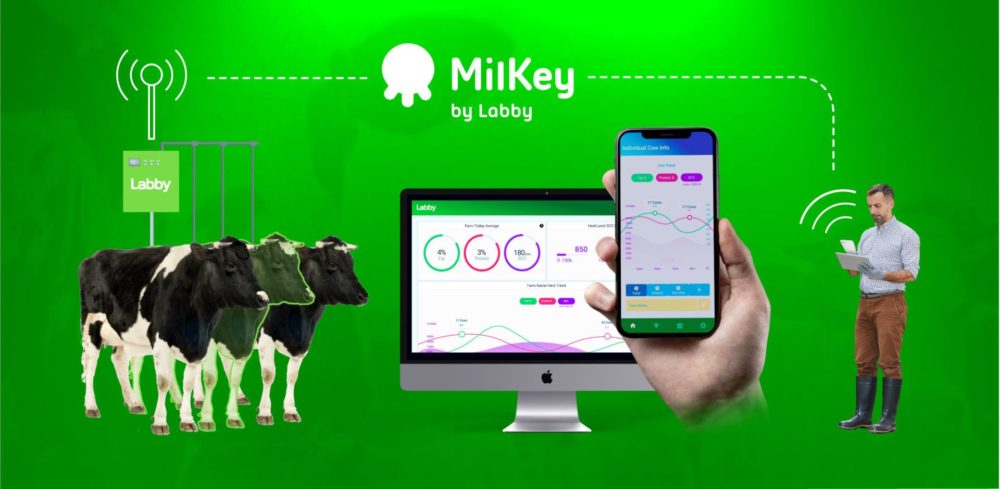The global dairy industry suffers between $19.7 billion and $30 billion in annual losses thanks to mastitis, according to the University of Glasgow.
For milk testing technology startup Labby, it’s not a matter of if a dairy cow will get mastitis, but when.
The Cambridge, Massachusetts-based company recently raised $480,000 in seed funding from AgriTech Capital. Its spectrometer and AI-based technology provides dairy farmers with accurate and rapid testing to identify the fat and protein content of milk. It also allows farmers to detect potential bacterial infections, by counting the number of somatic cells in the milk. These increase when infections are present.
The startup’s two products are a handheld device — which is Bluetooth equipped so it can be paired with a smartphone to deliver testing results within five seconds — and an in-line sensor.
“The buzzword I would use to describe it is live intelligence,” Labby CEO and co-founder Julia Somerdin told AFN. “It has been really positively accepted by dairy farmers and veterinarians as a tool to allow them to do spot checks when bulking milk – or even for transition cows and dry cows.”
The company is a Techstars Lisbon Accelerator 2020 graduate and participated in the Dairy Farmers of America Accelerator program in 2019. It also made it to the finals of the 2018 MassChallenge.
Labby’s path to funding started during its tenure at Techstars. Somerdin recalled doing a pitch where Aiden Connolly, president of AgriTech Capital, was one of the judges.
“He was really interested in the topic because he was aware that there is a real problem with real-time data processing in the dairy industry,” she said.
The majority of the funding will be used for product development, including tweaks to Labby’s existing hardware and software. Right now, the company is working on the second generation of its products after working on pilots with farmers in Illinois, New York, and Pennsylvania. More dairy farms in North America are starting pilots with the technology before the end of the year.
The funding will also be used to hire a mechanical engineer and a data scientist, as well as supporting sales and marketing activities including trade show exhibitions and product demos.
Due to the titanic size of the mastitis problem, several startups are working on solutions to help farmers catch oncoming infections more quickly. Connecterra, EIO Diagnostics, MastiLine, ,Acumen Detection, and Soma Detect are all developing some form of testing for early mastitis detection. [Disclosure: Connecterra is a portfolio company of AgFunder, which is AFN‘s parent company.]
“In the past few years, some of [Labby’s competitors] have shifted out of milk testing because [it is] actually is really hard – not only to be able to do the testing, but to present accurate and meaningful results,” Somerdin said.
The complexity of the problem may also be partly ascribed to the behemoth nature of the dairy industry. Somerdin said that understanding the industry’s dynamics and stakeholder workflow took her team a few months to pin down.
But the biggest challenge for Labby, in her view, is getting the results right. To make sure its technology is accurate, the startup needs raw milk samples for testing.
“The milk samples have to be truly representative of the milk quality. We were lucky to have a partner with [US farmer cooperative] Dairy One,” she said.
Beyond testing, there’s work being done on mastitis medications and treatments too. Last month, life sciences investment firm NovaQuest made its first foray into animal health, signing a $20 million peptide product development deal with Israeli biotech company Mileutis.





